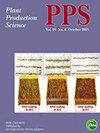水分管理与有机覆盖相结合对芋头植株生长和玉米营养的影响
IF 1.3
3区 农林科学
Q2 AGRONOMY
引用次数: 2
摘要
摘要:芋头(Colocasia esculenta L.Schott)是非洲、西印度群岛、太平洋地区和东南亚发展中国家的重要主食。由于芋头几乎可以在世界所有热带地区种植,它将在粮食安全方面发挥至关重要的作用。有机覆盖物的使用有助于土壤水分管理、杂草控制和施肥,在农学上显示出一种环保的方法。在本研究中,进行了包括两个种植季节(I和II)的田间试验,以评估有机覆盖的水分制度对芋头生长和球茎营养价值的影响。结果表明,与旱地相比,淹水条件下的芋头种植具有较高的土壤肥力水平和较好的杂草控制效果。淹水制度更多地促进了芋头植物的生长,并进一步提高了收获球茎的产量;此外,甘蔗渣和稻壳将是获得更好球茎属性的优质覆盖物。相比之下,旱地栽培比淹水栽培更能提高芋头球茎的营养价值。无论是旱地还是淹水,稻壳覆盖处理都比甘蔗渣和花生壳覆盖处理更能丰富芋头的营养。此外,水分状况和覆盖对芋头植物生长和球茎属性的影响会随着营养生长期间的降雨量而变化。图形摘要本文章由计算机程序翻译,如有差异,请以英文原文为准。
Influences of water management combined with organic mulching on taro plant growth and corm nutrition
ABSTRACT Taro (Colocasia esculenta L. Schott) is an important food staple in developing countries in Africa, West Indies, the Pacific region, and Southeast Asia. Because taro can be grown in almost all tropical regions of the world, it will play a crucial role in food security. The use of organic mulches, which contribute to soil water management, weed control, and fertilization simultaneously, shows promise as an eco-friendly approach in agronomy. In the present study, a field experiment including two cropping seasons (I and II) was conducted to evaluate the effects of water regimes with organic mulching on the taro growth and corm nutritive values. In results, compared with that under the upland regime, taro cultivation under the flooding regime had a higher level of soil fertility and better weed control. The flooding regime promoted more the taro plant growth and further enhanced the yields of the harvested corms; also, sugarcane bagasse and rice husk would be the superior mulch to obtain better corm attributes. By contrast, cultivation under the upland regime enhanced the nutritive values of taro corm more than did that under the flooding regime. Regardless of the upland or flooded regime, mulching treatments with rice husk could enrich taro corm nutrition more than could those with sugarcane bagasse and peanut hull. Also, the effects of water regime and mulching on taro plant growth and corm attributes would be varied with the rainfalls during the period of vegetative growth. Graphical abstract
求助全文
通过发布文献求助,成功后即可免费获取论文全文。
去求助
来源期刊

Plant Production Science
农林科学-农艺学
CiteScore
5.10
自引率
4.00%
发文量
27
审稿时长
>36 weeks
期刊介绍:
Plant Production Science publishes original research reports on field crops and resource plants, their production and related subjects, covering a wide range of sciences; physiology, biotechnology, morphology, ecology, cropping system, production technology and post harvest management. Studies on plant production with special attention to resource management and the environment are also welcome. Field surveys on cropping or farming system are also accepted. Articles with a background in other research areas such as soil science, meteorology, biometry, product process and plant protection will be accepted as long as they are significantly related to plant production.
 求助内容:
求助内容: 应助结果提醒方式:
应助结果提醒方式:


